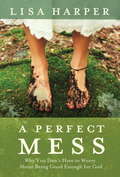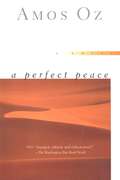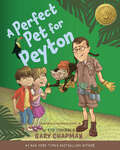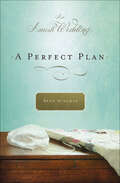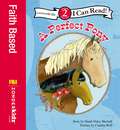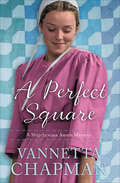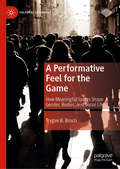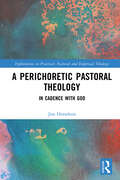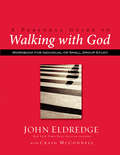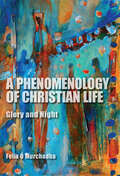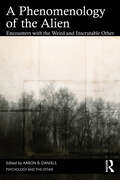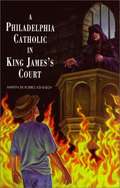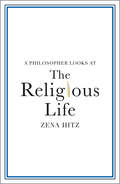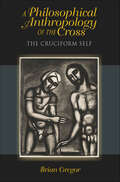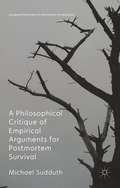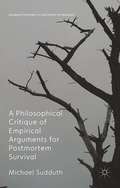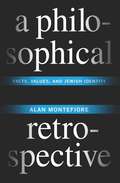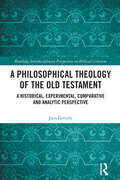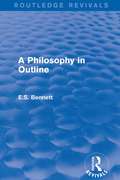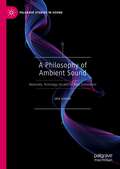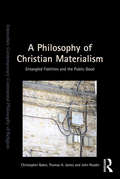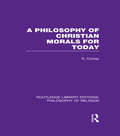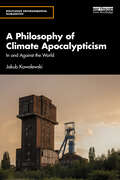- Table View
- List View
A Perfect Mess: Why You Don't Have to Worry About Being Good Enough for God
by Lisa HarperOn those days when French fries litter the floor of your minivan, when you think bad words about other drivers, when your smile hides an anxious heart–in those moments when you fall short of all you’d hoped to be–what does God see when He looks at you? In your less-than-lovely moments, God sees a precious daughter in need of His perfect love. In this liberating look at how God adores and transforms imperfect people, Bible teacher Lisa Harper weaves poignant stories of her own personal foibles with a fresh take on selected Psalms to reveal a loving Father who remains your greatest champion even when you don’t feel anywhere close to holy. Join Lisa in discovering what happens when we stop trying to hide our inadequacies and doubts and instead trust God with our anger, frustrations, flaws, and regrets. As you accept God’s loving invitation to exchange your junk for His joy, you’ll find the imperfect pieces of your life shaped into a glorious pattern of divine grace. From the Trade Paperback edition.
A Perfect Peace: A Novel
by Amos Oz&“Oz&’s strangest, riskiest, and richest novel.&” —Washington Post Book WorldIsrael, just before the Six-Day War. On a kibbutz, the country&’s founders and their children struggle to come to terms with their land and with each other. The messianic father exults in accomplishments that had once been only dreams; the son longs to establish an identity apart from his father; the fragile young wife is out of touch with reality; and the gifted and charismatic &“outsider&” seethes with emotion. Through the interplay of these brilliantly realized characters, Oz evokes a drama that is chillingly, strikingly universal.&“[Oz is] a peerless, imaginative chronicler of his country&’s inner and outer transformations.&” —Independent (UK)
A Perfect Pet for Peyton: A 5 Love Languages Discovery Book
by Gary Chapman Rick OsborneGary Chapman and Rick Osborne help children learn about the importance of love in this wonderfully imaginative and classically illustrated children&’s hardcover book featuring four-color illustrations (with hidden details!) by Wilson Williams, Jr., and based on Gary&’s bestselling The 5 Love Languages. Each child in this entertaining and playful story learns that they have a primary love language that when "spoken" by others, makes them feel loved. As the five children in the story interact with Mr. Chapman and the unique animals at his special zoo/museum/theme park/birthday party palace, they come to understand their own love language! Readers, especially children ages 5–8, are sure to recognize their own love language as the story develops, and at the end of the book is a fun quiz that will help parents and children identify their own love language.The cast of child characters in this whimsical story include: Penny, Peyton's twin sister, who receives love best when others spend quality time with her. Mr. Chapman introduces Penny to Horace, a Ragdoll Cat who just wants to be with Penny. Jayla, one of Penny's close friends, is always saying nice things about people. Her love language is words of affirmation. Jayla's perfect pet pal is Pamela, an African Grey Parrot, who repeats the nice things Jayla says about others. Kevin, one of Peyton's close friends, enjoys giving things to people. So does his special pet Chipo, a Capuchin Monkey! Sofia loves to pet the animals, and to show her love for others with special hugs. Physical touch is Sofia's love language. Snuggles
A Perfect Pet for Peyton: A 5 Love Languages Discovery Book
by Gary Chapman Rick OsborneGary Chapman and Rick Osborne help children learn about the importance of love in this wonderfully imaginative and classically illustrated children&’s hardcover book featuring four-color illustrations (with hidden details!) by Wilson Williams, Jr., and based on Gary&’s bestselling The 5 Love Languages. Each child in this entertaining and playful story learns that they have a primary love language that when "spoken" by others, makes them feel loved. As the five children in the story interact with Mr. Chapman and the unique animals at his special zoo/museum/theme park/birthday party palace, they come to understand their own love language! Readers, especially children ages 5–8, are sure to recognize their own love language as the story develops, and at the end of the book is a fun quiz that will help parents and children identify their own love language.The cast of child characters in this whimsical story include: Penny, Peyton's twin sister, who receives love best when others spend quality time with her. Mr. Chapman introduces Penny to Horace, a Ragdoll Cat who just wants to be with Penny. Jayla, one of Penny's close friends, is always saying nice things about people. Her love language is words of affirmation. Jayla's perfect pet pal is Pamela, an African Grey Parrot, who repeats the nice things Jayla says about others. Kevin, one of Peyton's close friends, enjoys giving things to people. So does his special pet Chipo, a Capuchin Monkey! Sofia loves to pet the animals, and to show her love for others with special hugs. Physical touch is Sofia's love language. Snuggles
A Perfect Plan: An Amish Wedding Novella (Amish Wedding Novellas)
by Beth WisemanPriscilla King has been planning to marry Chester Lapp since she was sixteen years old, and when Chester pops the question on Priscilla&’s nineteenth birthday, wedding plans begin immediately.But what happens when everything that can go wrong does?Chester works to build a house for his new bride, only to have one disaster after another occur. Priscilla&’s father planted an excess amount of celery in preparation for a wedding he thought would be in order soon. A failed crop threatens to puts a damper on the event. Priscilla&’s wedding dress is mistakenly cut up to use for dusting rags, and one of her bridesmaids breaks out in a horrible rash before the wedding. And if all that isn&’t enough, Priscilla develops a case of hiccups that seems to forewarn her every time a mishap is about to occur.Can true love take this couple through the challenges that threaten their union, or will they begin to doubt that they are on the right path, the one God has chosen for them?
A Perfect Pony: Level 2 (I Can Read! #Level 2)
by Dandi Daley MackallA Lesson in Being Grateful. When Jen’s best friend Dave gets a pony for his birthday Jen is jealous and finds things wrong with her own horse! Will she learn what it means to be grateful for what she has?
A Perfect Square (The Shipshewana Amish Mysteries #2)
by Vannetta ChapmanAmish-English sleuthing duo Deborah Yoder and Callie Harper set out to solve a murder. But more than an innocent man&’s future is at stake. In book two of the Shipshewana Amish Mystery series, God&’s grace touches the long-lost past as well as lives shaken by current tragedy.There's more to the quaint northern Indiana town of Shipshewana than handcrafted quilts, Amish-made furniture, immaculate farms and close-knit families. When a dead girl is found floating in a local pond, murder is also afoot. And Reuben, brother of Deborah's best friend's fiancé, is in jail as the suspect! Reuben refuses to divulge any information, even to clear himself of a crime Deborah is certain he didn't commit. So, with her English friend Callie—fellow sleuth and owner of Daisy's Quilt Shop—Deborah sets out to uncover the truth. But the mystery deepens when an elderly man seeks Callie's help in finding his long-lost daughter, missing since the days of the 1965 Palm Sunday Tornadoes.An old man who has lost his past. A young man who may lose his future. Once again Deborah and Callie find themselves trying to piece together a crazy quilt of lives and events—one that can bring unexpected touches of God's grace and resolve the tragedy that has shaken this quiet Amish community.
A Performative Feel for the Game: How Meaningful Sports Shape Gender, Bodies, and Social Life (Cultural Sociology)
by Trygve B. BrochApplying a cultural sociology of performance, this book interrogates how the meaning of sport intersects with gender. Trygve B. Broch points out uncertainties in the causal arguments made by key figures in the cultural studies tradition, instead advancing a meaning-centered study of sports as involving both a social and an athletic performance. Sports not only reflect or reverse social realities, but capture and keep our attention when we use and experience them as a means to reflect on social life, injustice, and hierarchy. More specifically, blending approaches from media studies with ethnography, Broch explores the women-dominated sport of handball in Norway, a country that considers gender equality a basis of democracy. As such, the analyses here show how broadly available meanings about sameness and equality are mediated and experienced through a performative feel for the game.
A Perichoretic Pastoral Theology: In Cadence with God (Explorations in Practical, Pastoral and Empirical Theology)
by Jim HorsthuisThis book articulates a perichoretic pastoral theology, offering a pastoral theological response to the question of how ministering persons practice ministry in communion with the triune God. Key elements from contemporary pastoral theology—theologies of human experience, concern for human suffering, and situational attentiveness—are drawn into conversation with the doctrine of perichoresis. Jim Horsthuis provides a vision for life and ministry in relational, participational and spiritual communion with the Father, Son and Holy Spirit. The chapters explore four spiritual movements that foster this vision: (1) the move from experience to relationship; (2) the move from concern to presence; (3) the move from competence to communion; and (4) the move from practice to prayer. The book represents a unique academic contribution to both pastoral theology and Trinitarian theology.
A Persistent Threat: The Evolution of al Qa'ida and Other Salafi Jihadists
by Seth G. JonesThis report examines the status and evolution of al Qa'ida and other Salafi-jihadist groups, and uses qualitative and quantitative data to assess whether this movement has strengthened. The author uses this analysis to examine U. S. strategic options to counter al Qa'ida and other terrorist groups based on the threat level and the capacity of local governments.
A Personal Guide to Walking with God
by John EldredgeWe have a lot to sort through on any given day. A whole lot to navigate over the course of a week or a month. How am I going to come up with enough money to do the things I want to do? And what about love--is this the one? Why can't I overcome those "habits" that look more and more like addictions? Am I at the right church? What is God doing in my life?All day long we are making choices. How do we know what to do?We have two options. We can trudge through on our own, doing our best to figure it all out. Or, we can walk with God. As in, learn to hear his voice. Really. He offers to speak to us and guide us. Every day. It is an incredible offer. To accept that offer is to enter into an adventure filled with joy and risk, transformation and breakthrough. And more clarity than we ever thought possible.Now in A Personal Guide to Walking with God, you can get started in your personal journey to making God a part of every moment of your day. Complete with discussion questions and personal journaling space, John and Craig will lead you deeper into communion with God. Let the adventure begin.
A Phenomenology of Christian Life: Glory And Night
by Felix Ó MurchadhaHow does Christian philosophy address phenomena in the world? Felix Ó Murchadha believes that seeing, hearing, or otherwise sensing the world through faith requires transcendence or thinking through glory and night (being and meaning). By challenging much of Western metaphysics, Ó Murchadha shows how phenomenology opens new ideas about being, and how philosophers of "the theological turn" have addressed questions of creation, incarnation, resurrection, time, love, and faith. He explores the possibility of a phenomenology of Christian life and argues against any simple separation of philosophy and theology or reason and faith.
A Phenomenology of the Alien: Encounters with the Weird and Inscrutable Other (Psychology and the Other)
by Aaron B. DanielsA Phenomenology of the Alien: Encounters with the Weird and Inscrutable Other considers both literal and figurative experiences of the alien from a psychological, psychoanalytic and philosophical perspective.Throughout the book, the authors wrestle with the unexplained, ineffable, unspeakable, sublime, uncanny, abject and Miéville’s abcanny. This collection provides phenomenologies of encounters with the inscrutably alien from lights in the sky, dark corners of Weird fictional landscapes, architecture, technology, or the clinical symptom. The chapters examine fictional and nonfictional encounters with what exceeds the capacity to “make sense,” taking a new approach to the topic of alterity and inviting the reader to examine how these encounters reflect our contemporary condition culturally, individually, clinically, theologically and philosophically.Bridging cultural, psychoanalytic, literary, clinical, media, and religious studies, the novel approaches in this volume will be of interest to students and scholars alike.
A Philadelphia Catholic In King James's Court
by Martin de Porres KennedyAfter the tragic death of his father, Michael O'Shea travels from his native Philadelphia to rural Kentucky for the summer. In this land of tobacco farming, bluegrass music, and devout fundamentalist Christianity, he is compelled to explain and justify the Catholic faith. His only defense, the Bible. <p><p> Join Michael on an Amish-style farmstead as he learns to milk a cow, harness a horse, disk a field, and harvest hay with a team instead of a tractor. Will he discover the truth about the papacy, the Eucharist, and devotion to Mary in Sacred Scripture?
A Philosopher Looks at the Religious Life
by Zena HitzWhat is happiness? Does life have a meaning? If so, is that meaning available in an ordinary life? The philosopher Zena Hitz confronted these questions head-on when she spent several years living in a Christian religious community. Religious life -- the communal life chosen by monks, nuns, friars, and hermits -- has been a part of global Christianity since earliest times, but many of us struggle to understand what could drive a person to renounce wealth, sex, children, and ambition to live a life of prayer and sacrifice. Hitz's lively and accessible book explores questions about faith, sacrifice, asceticism and happiness through philosophy, stories, and examples from religious life. Drawing on personal experience as well as film, literature, history, biography, and theology, it demystifies an important element of contemporary culture, and provides a picture of human flourishing and happiness which challenges and enriches modern-day life.
A Philosophical Anthropology of the Cross: The Cruciform Self (Philosophy of Religion)
by Brian GregorWhat does the cross, both as a historical event and a symbol of religious discourse, tell us about human beings? In this provocative book, Brian Gregor draws together a hermeneutics of the self—through Heidegger, Gadamer, Ricoeur, and Taylor—and a theology of the cross—through Luther, Kierkegaard, Bonhoeffer, and Jüngel—to envision a phenomenology of the cruciform self. The result is a bold and original view of what philosophical anthropology could look like if it took the scandal of the cross seriously instead of reducing it into general philosophical concepts.
A Philosophical Critique of Empirical Arguments for Postmortem Survival (Palgrave Frontiers in Philosophy of Religion)
by Michael SudduthA Philosophical Critique of Empirical Arguments for Postmortem Survival.
A Philosophical Critique of Empirical Arguments for Postmortem Survival (Palgrave Frontiers in Philosophy of Religion)
by Michael SudduthSudduth provides a critical exploration of classical empirical arguments for survival arguments that purport to show that data collected from ostensibly paranormal phenomena constitute good evidence for the survival of the self after death. Utilizing the conceptual tools of formal epistemology, he argues that classical arguments are unsuccessful.
A Philosophical Retrospective: Facts, Values, and Jewish Identity (Columbia Themes in Philosophy)
by Alan MontefioreAs a young lecturer in philosophy and the eldest son of a prominent Jewish family, Alan Montefiore faced two very different understandings of his identity: the more traditional view that an identity such as his carried with it, as a matter of given fact, certain duties and obligations, and an opposing view, emphasized by his studies in philosophy, according to which there can be no rationally compelling move from statements of fact-whatever the alleged facts may be-to "judgments of value." According to this second view, individuals must in the end take responsibility for determining their own values and obligations.In this book, Montefiore looks back on his attempts to understand the nature of this conflict and the misunderstandings it may engender. In the process, he illustrates through personal experience the practical implications of a characteristically philosophical issue. Montefiore finally settles on the following: while everyone has to accept that facts, including those of their own situation, are whatever they may be, both the "traditional" assumption that individuals must recognize certain values and obligations as rooted in those very facts, and the contrary view that individuals are ultimately responsible for determining their own values, are deeply embedded in differing conceptions of society and its relation to its members. Montefiore then examines the misunderstandings between those for whom identity constitutes in effect a conceptual bridge connecting the facts of who and what a person may be to the value commitments incumbent upon them, and those for whom the very idea of such a bridge can be nothing but a confusion. Using key examples from the notoriously vexed case of Jewish identity and from his own encounters with its conflicting meanings and implications, Montefiore depicts the practical significance of the differences between these worldviews, particularly for those who hove to negotiate them.
A Philosophical Theology of the Old Testament: A historical, experimental, comparative and analytic perspective (Routledge Interdisciplinary Perspectives on Biblical Criticism)
by Jaco GerickeAre we able to identify and compare the philosophical perspectives and questions that must be postulated as having been somehow present in the language, ideas and worldviews of the Biblical authors? This book sets out an approach to something that has been generally considered impossible: a philosophical theology of the Old Testament. It demonstrates and addresses the neglect of a descriptive and comparative philosophical clarification of concepts in Old Testament theology, and in so doing treads new ground in Biblical studies and philosophical theology. Recognizing the obvious problems with, and objections to, any form of interdisciplinary research combining philosophical and Biblical theology, this study presents itself as introductory and experimental in nature. The methodology opted for is limited to a philosophical clarification of concepts already found in Old Testament theology, while the findings are presented via the popular thematic approach found in analytic philosophical theologies; with no attempted justification or critique of the textual contents under investigation. These approaches are combined by primarily looking at the nature of Yahweh in the Old Testament. This book offers a new vision of Biblical and philosophical theology that brings them closer together in order that we might understand both more broadly and deeply. As such, it will be vital reading for scholars of Theology, Biblical Studies and Philosophy.
A Philosophy in Outline (Routledge Revivals)
by E.S. BennettFirst published in 1931, this book provides a brief overview of the essentials of philosophy. It aims to combat the notion of the inaccessibility of philosophy by providing an introduction to its history and what the author believes to a ‘minimum dose…of incontrovertible philosophical truth’. The book merely assumes an ordinary level of adult education and offers an outline of the key areas of philosophy — consciousness, reality, experience, Life, God, love, aesthetics, conduct, logic — and as such will be of interest as a very useful starting point for anyone wishing to undertake further studies.
A Philosophy of Ambient Sound: Materiality, Technology, Art and the Sonic Environment (Palgrave Studies in Sound)
by Ulrik SchmidtThis book presents the first book-length study of ambient sound as a key issue in sound studies and sonic philosophy. Taking a broad, media-philosophical approach, it explores ambient sound as a basic dimension of the sonic environment, sonic technologies, sonic arts and the material staging of listening.Through analyses of key concepts such as surroundability, mediatization, immanence, synthetization and continuous variation, the book elucidates how ambient aspects of sound influence our conceptions of what sound is and how it affects us by exposing sound’s relation to basic categories such as space, time, environment, medium and materiality. It also illuminates how the strategic production of ambient sound constitutes a leading aesthetic paradigm that has been a decisive factor in the shaping of the modern sonic environment – from key developments in experimental and popular music, sound art and cinematic sound design to the architectural-technological construction of listening spaces in concert halls and theaters and in current streaming infrastructures, digital surround sound and the everyday aesthetics of headphone listening.
A Philosophy of Christian Materialism: Entangled Fidelities and the Public Good (Intensities: Contemporary Continental Philosophy of Religion)
by Christopher Baker John Reader Thomas A. JamesA Philosophy of Christian Materialism offers a new religious engagement with the public sphere via means of interdisciplinary analysis and empirical examples, developing what the authors call a Relational Christian Realism building upon interaction with contemporary Philosophy of Religion. The book argues that the current discourse on public religion is inadequate in addressing the issues now to be faced, including: material religious practice in the sphere of education; the growth of alternative political movements and the developing awareness of environmental concerns and urban social justice. Key concepts that support this strategic analysis are: entangled fidelities (the form of a materialist religious practice); the possibility of a relational Christian realism (including new developments in how we interpret key categories of doctrine including God and creation, salvation and humanity), and the post-secular public sphere (including the emerging phenomenon of postsecular rapprochement - namely the coming together of both religious and secular actors in methodologies and politics of pragmatism as well as ethical discourse for the sake of the public commons). Co-authored by theologians in both the USA and the UK, this book represents an exciting contribution to philosophy and practice of religion on both sides of the Atlantic and aspires to be sufficiently interdisciplinary to also appeal to readerships engaged in the study of modern political and social trends.
A Philosophy of Christian Morals for Today (Routledge Library Editions: Philosophy of Religion)
by Robert CorkeyPhilosophers have been sharply divided in attempts to reconcile the validity of the moral distinctions essential to social well-being with the apparent ethical neutrality of the factual world. The failure to find an agreed solution to this problem produced the popular theory of Logical Empiricism, according to which ethical statements are meaningless. This and other kindred doctrines of ethical relativism that emerged in the first half of the twentieth century, are obviously fatal to the Christian belief that there is ‘down here below’ a recognisable Kingdom of God that men were born to serve. In this book, originally published in 1961, the author offer a complete analysis of the nature of ethical perception to show how the two factors in moral decisions – a sense of moral obligation, and recognisable objective ethical values – can both be brought into a single coherent system of truth. He isolates the unique and ultimate element common to all our ethical and moral concepts and presents a clear view that the basic values recognised in a reasonable humanistic morality are embraced in the wider ideals of Christian Love. The purpose is to present a coherent system of moral truth that will, in this scientific age, commend itself to thoughtful people without offending their intelligence.
A Philosophy of Climate Apocalypticism: In and Against the World (Routledge Environmental Humanities)
by Jakub KowalewskiThis book offers a long-overdue analysis of the ubiquity of eco-apocalypticism in current discourses on the climate crisis.Drawing on a wide range of sources and theoretical traditions from ecological works and radical pamphlets, through political theology and continental philosophy to ancient and medieval apocalypses, the book sheds a comprehensive light on the concepts, processes, and experiences which circulate around the figure of the environmental end of the world. Importantly, this book argues that apocalypticism can provide a productive philosophical framework for addressing the climate catastrophe, enabling us to propose a distinctive answer to the fundamental question which haunts progressive ecological projects: how can we defend the world we find indefensible?Appealing to students, academics, and researchers in philosophy, political theology, and environmental humanities, this book is a timely intervention which hopes to demonstrate that, when all else fails, it is the end of the world which may save the planet.
